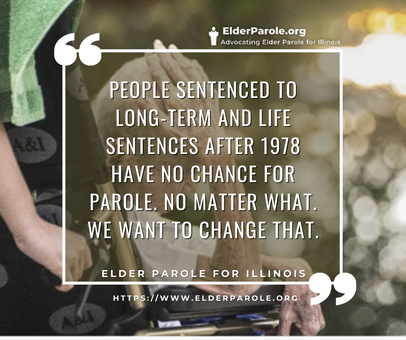Take Action Today! Ask Your State Leaders to Support Elder Parole HB2045
Click here for the letter to print and mail or scan and send to [email protected]. Please share with your social justice teams and friends to send in! Or click below to download the file.
| dear_governor_pritzker_revised.docx | |
| File Size: | 15 kb |
| File Type: | docx |
HB 2045 Sponsored by Representative Justin Slaughter
ELDER PAROLE: A PROCESS FOR PERMITTING A SELECT FEW PERSONS IN
PRISON WHO ARE THE OLDEST, AND HAVE SERVED THE LONGEST TIME, TO
PROVE TO THE PAROLE BOARD THAT THEY ARE READY TO REJOIN SOCIETY
THE PROBLEM: Illinois’ prison population has an increasing percentage of persons who are
growing old in prison and have no opportunity for early release, no matter how rehabilitated they
are. These persons have aged out of crime, are unlikely to re-offend, and are the most expensive
for the State to continue to imprison due to medical expenses for old age and end of life care.
The percentage of IDOC inmates 55 and older has increased from 3.4% in 2005 to 14%
in 2022. Due to the stresses of prison life and the disadvantaged backgrounds of these
people, they have generally aged more than their years indicate.
Experience shows that persons who commit violent crimes when they are young age out
of crime: in Maryland, 199 people with life sentences, ages 51-85, were released as a
result of a court decision, and had a recidivism rate of 3% versus 40% for the general
prison population.
The average per-person cost of a prisoner in Illinois for fiscal 2020 was $34,362. The
John Howard Assn estimates that an average older person in prison can cost more than
twice as much, or over $68,000.
Illinois abolished parole on Feb. 1, 1978 for all persons sentenced before that date,
leaving executive clemency as the only remaining way to obtain early release.
THE SOLUTION: The Elder Parole Bill
To apply for early release under the Elder Parole Bill, an individual would have to be 55
years of age or older, and incarcerated for at least 25 consecutive years. This would
extend the right to parole to only 997 persons, which is only 3.5% of the population.
Illinois has recently instituted a medical release process for those who are terminally ill or
medically incapacitated. Elder Parole would build on this by allowing a select few, who
are approaching old age, to seek early release before they are terminally ill or
incapacitated, and before requiring the medical expenses of old age and end of life care,
when they can still contribute to society.
Victims’ families would have to be notified and given an opportunity to participate in the
parole hearing.
A parole hearing would be conducted by a panel of 8 members of the Prisoner Review
Board, with the decision to be made by a majority of the panel.
To address the aging of the prison population that already exists, the Elder Parole law
would apply retroactively to include time served before enactment of the law.
Eligibility to apply would include those with natural life sentences, and sentences of life
without possibility of parole.
ELDER PAROLE: A PROCESS FOR PERMITTING A SELECT FEW PERSONS IN
PRISON WHO ARE THE OLDEST, AND HAVE SERVED THE LONGEST TIME, TO
PROVE TO THE PAROLE BOARD THAT THEY ARE READY TO REJOIN SOCIETY
THE PROBLEM: Illinois’ prison population has an increasing percentage of persons who are
growing old in prison and have no opportunity for early release, no matter how rehabilitated they
are. These persons have aged out of crime, are unlikely to re-offend, and are the most expensive
for the State to continue to imprison due to medical expenses for old age and end of life care.
The percentage of IDOC inmates 55 and older has increased from 3.4% in 2005 to 14%
in 2022. Due to the stresses of prison life and the disadvantaged backgrounds of these
people, they have generally aged more than their years indicate.
Experience shows that persons who commit violent crimes when they are young age out
of crime: in Maryland, 199 people with life sentences, ages 51-85, were released as a
result of a court decision, and had a recidivism rate of 3% versus 40% for the general
prison population.
The average per-person cost of a prisoner in Illinois for fiscal 2020 was $34,362. The
John Howard Assn estimates that an average older person in prison can cost more than
twice as much, or over $68,000.
Illinois abolished parole on Feb. 1, 1978 for all persons sentenced before that date,
leaving executive clemency as the only remaining way to obtain early release.
THE SOLUTION: The Elder Parole Bill
To apply for early release under the Elder Parole Bill, an individual would have to be 55
years of age or older, and incarcerated for at least 25 consecutive years. This would
extend the right to parole to only 997 persons, which is only 3.5% of the population.
Illinois has recently instituted a medical release process for those who are terminally ill or
medically incapacitated. Elder Parole would build on this by allowing a select few, who
are approaching old age, to seek early release before they are terminally ill or
incapacitated, and before requiring the medical expenses of old age and end of life care,
when they can still contribute to society.
Victims’ families would have to be notified and given an opportunity to participate in the
parole hearing.
A parole hearing would be conducted by a panel of 8 members of the Prisoner Review
Board, with the decision to be made by a majority of the panel.
To address the aging of the prison population that already exists, the Elder Parole law
would apply retroactively to include time served before enactment of the law.
Eligibility to apply would include those with natural life sentences, and sentences of life
without possibility of parole.
